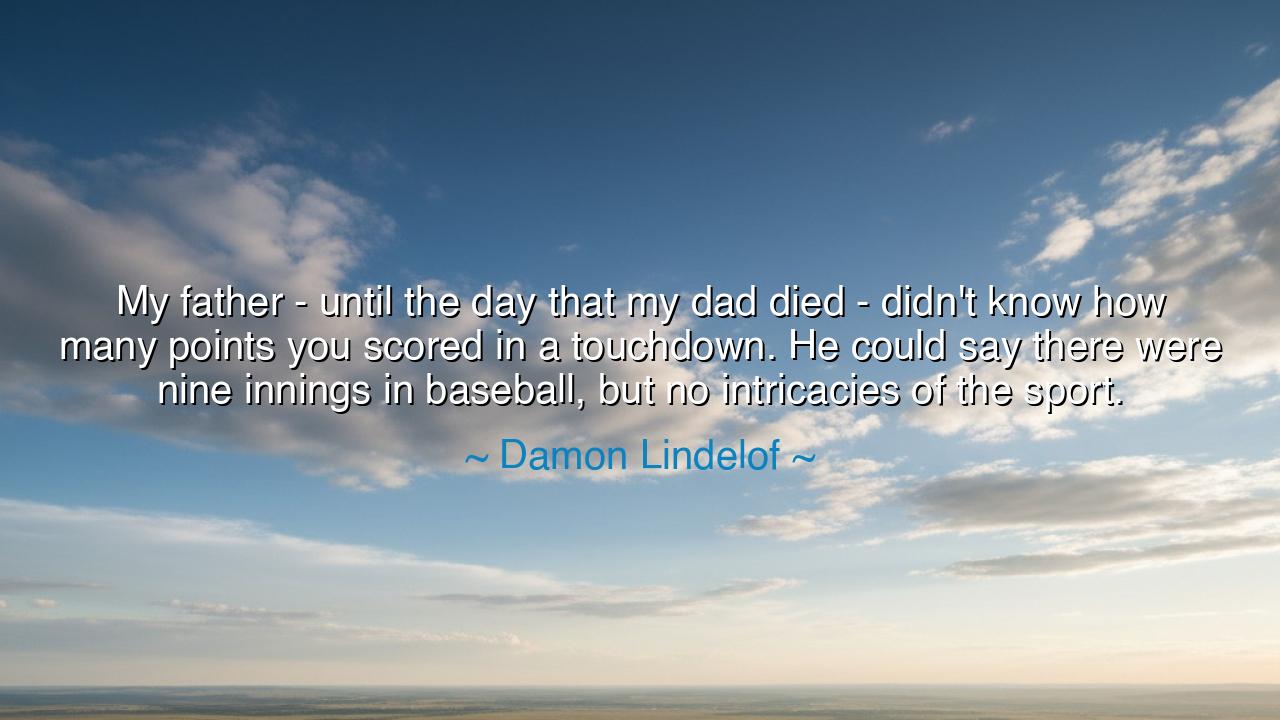
My father - until the day that my dad died - didn't know how many
My father - until the day that my dad died - didn't know how many points you scored in a touchdown. He could say there were nine innings in baseball, but no intricacies of the sport.






In the reflective words of Damon Lindelof, we encounter a truth that shines quietly, like an ember glowing beneath the ashes of memory: “My father—until the day that my dad died—didn't know how many points you scored in a touchdown. He could say there were nine innings in baseball, but no intricacies of the sport.” At first, these words seem almost humorous, a son’s fond recollection of a father’s indifference to games. Yet beneath that simplicity lies something profound: the measure of a man’s worth is not found in how much he knows of rules and statistics, but in how deeply he lives, loves, and influences those around him. The father’s ignorance of sport is not a failure—it is a testament that wisdom does not always dwell in trivia, and greatness does not always wear the garments of knowledge.
The origin of this quote comes from Lindelof’s remembrance of his father, a man who may not have been versed in the language of touchdowns or scoreboards, yet left an imprint far greater than the champions of any game. It speaks to the quiet truth that every parent teaches, not through expertise, but through example. The father did not teach his son the intricacies of play, but the subtler art of presence, humility, and authenticity. In a world that celebrates skill and mastery, this quote reminds us that love and legacy often dwell in the unspoken—those moments when understanding is replaced by simple being.
The ancients, too, knew this truth. They taught that wisdom is not measured in cleverness, but in depth of soul. Socrates himself confessed that he knew nothing, and yet was called the wisest of men. For what matters most in life is not the accumulation of facts, but the cultivation of truth within one’s heart. Lindelof’s father may not have grasped the points of a touchdown, but he grasped the points of life—the weight of honesty, the value of kindness, the sacred duty of fatherhood. To know the game is one thing; to shape a son who remembers you with reverence and affection is another.
Consider the story of Albert Einstein, whose own father was a simple engineer. He could not follow the vast intricacies of his son’s discoveries, nor explain the theory of relativity or the curvature of space. Yet it was his quiet encouragement, his steadfast belief, and his humble labor that nourished the mind of genius. Einstein once said that the greatest influence in his life was not the scholars he met, but the character of his parents. And so, just as Lindelof’s father could not count points on the field, Einstein’s could not count equations—but both fathers gave something far greater: the foundation of wonder and the permission to dream.
The meaning of Lindelof’s words, then, is not about ignorance—it is about love without pretense. His father did not pretend to be someone he was not; he did not hide behind knowledge to earn respect. He was simply himself, and that authenticity became its own kind of wisdom. In the sacred bond between father and son, the greatest lessons are often wordless. A child may forget what his father explained, but never how his father made him feel. To be seen, to be accepted, to be loved without condition—these are lessons that outlast every touchdown and outshine every victory.
And yet, there is another layer of beauty here. The father’s disinterest in intricacies mirrors a deeper truth of life itself: that simplicity often holds more peace than complexity. While others chase understanding of the external world, the wise learn contentment in not knowing all. To live without needing to master every rule is to dwell in freedom. The father’s life, unburdened by the clamor of competition, teaches the son—and all of us—that joy can be found in the quiet act of being present, even if one doesn’t know the score.
The lesson, therefore, is this: measure no person by the weight of their knowledge, but by the light of their heart. Do not seek to know everything; seek to be true in what you know. Parents, remember—your children will remember your tone more than your lectures, your laughter more than your expertise. Be present; that is the greatest teaching of all. And children, cherish the simple wisdom of those who raised you, even when it does not wear the name of brilliance. For often the hands that built your future were guided not by intellect, but by love.
So, my listener, hold fast to this truth: greatness does not always speak in the language of scholars or athletes. Sometimes it speaks in the quiet voice of a father who knows little of games, yet much of grace. Damon Lindelof’s father may not have known how many points a touchdown earns—but he scored endlessly in the game that matters most: the raising of a soul who would remember him with love. And in the end, it is not the number of points we tally that defines us, but the depth of the hearts we touch.






AAdministratorAdministrator
Welcome, honored guests. Please leave a comment, we will respond soon